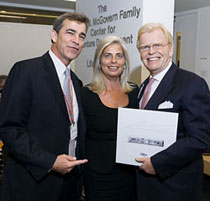COVER STORY SIDEBAR
Small business, big potential: New incubator will bring technology to life
Illuminaria makes a hand-held screener that takes less than 60 seconds to identify such contaminants as anthrax, E. coli and Listeria. AppleBoost produces supplements and snacks containing antioxidant-rich apple-peel powder. e2e Materials manufactures petroleum-free, biodegradable plastics from soy, bamboo, jute, flax and kenaf. GenVec develops drugs and vaccines for certain cancers as well as for HIV, malaria and influenza.

Some products from Cornell. See larger image
These are just some of the companies that market innovations by Cornell life scientists. More companies, growing from life sciences research, are on the way, and they will have a powerful new ally: The Kevin M. McGovern Family Center for Venture Development in the Life Sciences.
The center, named in honor of a $7.5 million gift made by McGovern '70, his wife, Lisa, and their two children, Jarrett '03 and Ashley '08, is Cornell's first-ever life sciences business incubation lab.
"What I do in business is no different from what this center is doing," McGovern said. "It's taking scientific ideas and gathering people who are skilled in how to apply those ideas -- whether businessmen or craftsmen or people who know how to distribute product."
Cornell's Entrepreneur of the Year in 2007, McGovern is a university trustee and member of the Life Sciences Advisory Board and the Cornell University Technology Transfer Advisory Committee. He is also chairman of the Executive Committee of the Entrepreneurship@Cornell Council.
His firm, McGovern Capital, owns a number of biotechnology- and nanotechnology-based companies. "Kevin really sees the value of research and how it could benefit people and economies," said Stephen Kresovich, vice provost for the life sciences.
On the whole, Cornell is competitive at technology transfer -- securing intellectual property and patent protections, turning innovations into products and services, and finding investors for business startups. But especially in life sciences technology, Cornell is aiming for more.
Stronger tech transfer performance will increase revenue from licensing agreements and related royalties and build the reputation of the university and its faculty while speeding life-improving innovations to market. And it will generate regional economic growth as technology companies take root. Robert Buhrman, senior vice provost for research, noted that the growth may also improve faculty recruitment by improving the overall job outlook for dual-career couples moving to the area.

Charles Phlegar, left, vice president for alumni affairs and development, with Lisa and Kevin McGovern '70. See larger image
The university starts with several advantages, most notably a powerhouse combination of nationally ranked engineering, veterinary medicine, human medicine, law and business schools. It has successful business alumni who give both their money and their knowledge to Cornell's startups. It also has a famously deep-rooted commitment to collaborative research.
While Cornell's small-town setting may be great for fostering an intellectual community, it's not as good for attracting venture capitalists, who typically look for opportunities in larger markets like Boston or San Francisco where the technology labor pool and business infrastructure are already developed, said Alan Paau, vice provost for technology transfer and economic development and director of the Cornell Center for Technology, Enterprise and Commercialization (CCTEC).
The McGovern Center looks to change the equation by providing affordable one-stop support for life sciences startups.
Occupying 6,700 square feet in Weill Hall, the center offers wet labs, offices and conference facilities for six to 10 companies. In a small market, commercial spaces like these are hard to come by, said Paau. "In the life sciences, there are organic solvents, chemicals, radioactive isotopes and biological samples. You need permits and specialized storage and lab equipment," he noted. "Getting a new product off the ground can be prohibitively expensive."
Initial plans suggest companies may need one or two years in the center to prove their concepts and business models before moving to an independent location.
"These will be the embryonic stages of a company," Kresovich said. "Our faculty have the science skills, but they don't necessarily know how to write a business plan or make their ideas attractive to investors."
That is why as researchers proceed with their work at the McGovern Center, CCTEC will set them up with investor and management leads; Johnson School faculty and students will advise on business plans and marketing; the Cornell Law School will offer intellectual property and patent advice; and experienced innovators and alumni will mentor them.
Assembling the staff, including a "go-getter" director, is the next step, Buhrman said. The university hopes to approve the first ventures for residency in the center by the end of the academic year.